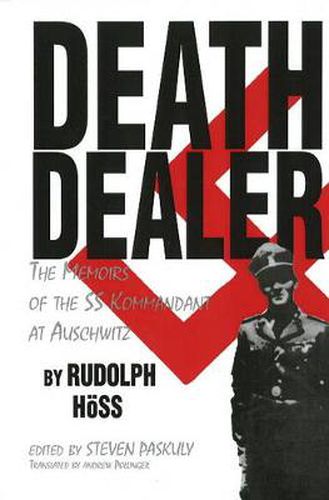Readings Newsletter
Become a Readings Member to make your shopping experience even easier.
Sign in or sign up for free!
You’re not far away from qualifying for FREE standard shipping within Australia
You’ve qualified for FREE standard shipping within Australia
The cart is loading…






This title is printed to order. This book may have been self-published. If so, we cannot guarantee the quality of the content. In the main most books will have gone through the editing process however some may not. We therefore suggest that you be aware of this before ordering this book. If in doubt check either the author or publisher’s details as we are unable to accept any returns unless they are faulty. Please contact us if you have any questions.
By his own admission, SS Kommandant Rudolf Hoss was history’s greatest mass murderer, having personally supervised the extermination of approximately two million people, mostly Jews, at the death camp in Auschwitz, Poland. Death Dealer is the first complete translation of Hoss’ memoirs into English. These bone-chilling memoirs were written between October 1946 and April 1947. At the suggestion of Professor Sanislaw Batawia, a psychologist, and Professor Jan Shen, the prosecuting attorney for the Polish War Crimes Commission in Warsaw, Hoss wrote a lengthy and detailed description of how the camp developed, his impressions of the various personalities with whom he dealt, and even the extermination of millions in the gas chambers. This written testimony is perhaps the most important document attesting to the Holocaust, because it is the only candid, detailed, and (for the most part) honest description of the Final Solution from a high-ranking SS officer intimately involved in carrying out the plans of Hitler and Himmler. With the cold objectivity of a common hit-man, Hoss chronicles the discovery of the most effective poison gas, and the technical obstacles that often thwarted his aim to kill as efficiently as possible. Staring at the horror without reacting, Hoss allowed conditions at Auschwitz to reduce human beings to walking skeletons - then he labelled them as sub-humans fit only to die. Readers will witness Hoss’ shallow rationalisations as he tries to balance his deeds with his increasingly disturbed, yet always ineffectual, conscience.
$9.00 standard shipping within Australia
FREE standard shipping within Australia for orders over $100.00
Express & International shipping calculated at checkout
This title is printed to order. This book may have been self-published. If so, we cannot guarantee the quality of the content. In the main most books will have gone through the editing process however some may not. We therefore suggest that you be aware of this before ordering this book. If in doubt check either the author or publisher’s details as we are unable to accept any returns unless they are faulty. Please contact us if you have any questions.
By his own admission, SS Kommandant Rudolf Hoss was history’s greatest mass murderer, having personally supervised the extermination of approximately two million people, mostly Jews, at the death camp in Auschwitz, Poland. Death Dealer is the first complete translation of Hoss’ memoirs into English. These bone-chilling memoirs were written between October 1946 and April 1947. At the suggestion of Professor Sanislaw Batawia, a psychologist, and Professor Jan Shen, the prosecuting attorney for the Polish War Crimes Commission in Warsaw, Hoss wrote a lengthy and detailed description of how the camp developed, his impressions of the various personalities with whom he dealt, and even the extermination of millions in the gas chambers. This written testimony is perhaps the most important document attesting to the Holocaust, because it is the only candid, detailed, and (for the most part) honest description of the Final Solution from a high-ranking SS officer intimately involved in carrying out the plans of Hitler and Himmler. With the cold objectivity of a common hit-man, Hoss chronicles the discovery of the most effective poison gas, and the technical obstacles that often thwarted his aim to kill as efficiently as possible. Staring at the horror without reacting, Hoss allowed conditions at Auschwitz to reduce human beings to walking skeletons - then he labelled them as sub-humans fit only to die. Readers will witness Hoss’ shallow rationalisations as he tries to balance his deeds with his increasingly disturbed, yet always ineffectual, conscience.